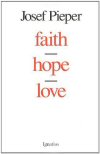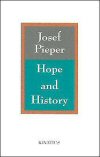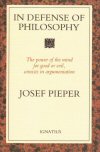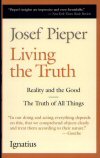Josef Pieper Collection (8 vols.)
Digital Verbum Edition
Overview
Tour the writings of one of the greatest Thomist philosophers, Josef Pieper. A well-respected and influential Catholic thinker, Pieper wrote profoundly on God, man, virtue, culture, and of course, philosophy. Examine Pieper’s treatises on faith, hope, love, and truth. Study his meditations on the end of time. Read along as he wields his fiery pen In Defense of Philosophy. Among other gems, this collection includes an illustrated autobiography of Pieper, offering a glimpse into the tumultuous times that shaped both this philosopher and his impact on modern Catholic thought.
In the Verbum editions, these volumes are enhanced amazing functionality. Important terms link to dictionaries, encyclopedias, and a wealth of other resources in your digital library. Perform powerful searches to find exactly what you’re looking for. Take the discussion with you using tablet and mobile apps. Your software brings the most efficient and comprehensive research tools together in one place, so you get the most out of your study.
For more in Thomistic studies, take a look at CUA Thomas Aquinas Moral Theology Collection (8 vols.).
Key Features
- Highlights twentieth-century Thomistic philosophy
- Offers insight into the shaping of contemporary Catholic philosophical thought
- Includes an illustrated autobiography of Josef Pieper
Product Details
- Title: Josef Pieper Collection
- Author: Josef Pieper
- Publisher: Ignatius
- Volumes: 8
- Pages: 1,647
- Christian Group: Catholic
- Resource Type: Collected Works
- Topic: Philosophy
Individual Titles

This volume is a collection of Josef Pieper’s famous treatises on the three theological virtues of faith, hope, and love. Each of these treatises was originally published as a separate work over a period of 37 years.
On Hope was written in 1934 in response to the despair of that era. On Faith was derived from a series of lectures he gave in the late 1950s and early 1960s. His most difficult work, one that he struggled with for years and almost abandoned—was On Love. Pieper felt that it was the most important book he had written. He discusses not only the theological virtue of caritas-agape, but also of eros, sexuality, and even “love” of music and wine.

In these elegant and engaging essays, internationally acclaimed Thomist philosopher Josef Pieper defines and defends philosophy as the search for and love of wisdom. True philosophy is not the work of joyless academics pondering over esoteric writings that have no bearing on real life. Rather, the philosophical act, in which all reasonable men can participate, begins in wonder at what is, and gratitude for what is given, and ends in love.
In his encyclical letter Fides et Ratio, Pope John Paul II called for a revitalization of true philosophy, for man can find fulfillment “only in choosing to enter the truth, to make a home under the shade of Wisdom and dwell there.” Pieper’s essays make the same ardent and convincing plea.
Pieper’s profound insights are impressive and even formidable.
—New York Times
Pieper has subjects involved in everyone’s life; he has theses that are so counter to the prevailing trends as to be sensational; and he has a style that is memorably clear and direct.
—Chicago Tribune

Josef Pieper, one of the greatest Thomistic philosophers of the twentieth century, gives a penetrating introduction to the life and works of St. Thomas Aquinas. Pieper provides a wonderful synthesis of his vast writings as well as a biography of Aquinas and an overview of the thirteenth century, when Aquinas lived and worked.
Pieper shows how Aquinas reconciled the pragmatic thought of Aristotle with the Church, proving that realistic knowledge need not preclude belief in the spiritual realities of religion. According to Pieper, the marriage of faith and reason proposed by Aquinas in his great synthesis of a “theologically founded worldliness” was not merely one solution among many, but the great principle expressing the essence of the Christian West. Pieper reveals his extraordinary command of original sources and excellent secondary materials as he illuminates the thought of the great intellectual Doctor of the Church.
One of the best introductions to the thought of Saint Thomas by one of the leading figures in the Thomistic revival.
—Ralph McInerny, Michael P. Grace Professor of Medieval Studies, University of Notre Dame

One of the twentieth century’s most influential Catholic philosophers, Josef Pieper, addresses the topic of hope from a historical perspective. Pieper looks at the movement of history, the idea of progress, man’s hope for a better future, and he counters the temptation to despair with a Christian philosophy of hope based on faith in divine providence and the compatibility of faith and reason.

This book is a battle between a great philosopher defending classical philosophy against an army of challengers to the very notion of philosophy as it is classically conceived. It is written in the spirit of the “scholastic disputations” of medieval universities, which produced the great summas—a mutual search for truth, a philosophical laboratory, a careful winnowing of each objection. Such objectivity is lamentably rare in contemporary philosophy.
In order to combat modern misunderstandings of challenges to the classical concept of philosophy, Josef Pieper shows us the value of philosophy as conceived by his masters: Socrates, Plato, Aristotle, Augustine, and above all, Aquinas. Along this path he scatters gems of insight, such as: art and religion as philosophy’s defenders, the relationship between philosophy and science, philosophy as “seeing and saying”, and philosophy as rooted in meditation and loving contemplation. Pieper emphasizes that philosophy is something all human beings do, and should be the better for doing.

This volume presents several illuminating treatises of Josef Pieper on Thomistic anthropology and on the principles of right human behavior based on anthropology. Living the Truth combines Piper’s books—Truth of All Things and Reality and the Good—into one volume.
With his characteristic lucidity, Pieper shows how all reality is positioned between the mind of God and the mind of man, and is the basis for man’s unquenchable yearning and the measure of all man’s knowledge. He then develops the Thomistic position that reality is also the basis for the good and therefore the norm of conscience and ethical action.

This engaging illustrated autobiography reveals a life that grew in and through momentous times. No One Could Have Known portrays the struggles of the young philosopher, his experiences during World War II, the evils of Nazism, and the difficulties of being an intellectual Christian during that period in history. Josef Pieper, well known as a lay philosopher who has popularized St. Thomas Aquinas, is respected throughout the world for his penetrating analysis and clear explanations of the most crucial Christian concepts. Trace his early years in the first part of the twentieth century, and his friendships with other intellectual leaders of our time—like Romano Guardini—that proved influential in Catholic intellectual history.

This is a work of rare prophetic brilliance by Josef Pieper, one of the twentieth century’s most profound and lucid expositors of the thought of St. Thomas Aquinas. This book throws light on an ancient question that has vexed and tormented many. What is the nature of “the end” toward which, even now, the world and men are moving? No writer of our time is better equipped to answer that question than Pieper. He provides the most rigorous and sustained philosophical analysis, anchored to “the primeval rock of theological pronouncement,” in order precisely to understand the finalities of time and history.
Between the nihilism and horror of an everlasting desolation and cheap technocratic optimism, Pieper reveals the essential character of Christian hope. A wonderful meditation for the coming millennium.
—Regis Martin, author, What Is the Church?
About Josef Pieper
Josef Pieper (1904–1997) was an influential philosopher in the neo-Thomistic movement of twentieth-century Catholic philosophy. Born in Germany, Pieper studied at the universities of Berlin and Münster, and spent much of his career as professor of philosophical anthropology at the University of Münster. He wrote many books, including The Four Cardinal Virtues: Prudence, Justice, Fortitude, Temperance, Leisure: the Basis of Culture, and The Silence of St. Thomas.
For more in Thomistic studies, take a look at CUA Thomas Aquinas Moral Theology Collection (8 vols.).
Key Features
- Highlights twentieth-century Thomistic philosophy
- Offers insight into the shaping of contemporary Catholic philosophical thought
- Includes an illustrated autobiography of Josef Pieper
Product Details
- Title: Josef Pieper Collection
- Author: Josef Pieper
- Publisher: Ignatius
- Volumes: 8
- Pages: 1,647
- Christian Group: Catholic
- Resource Type: Collected Works
- Topic: Philosophy
About Josef Pieper
Josef Pieper (1904–1997) was an influential philosopher in the neo-Thomistic movement of twentieth-century Catholic philosophy. Born in Germany, Pieper studied at the universities of Berlin and Münster, and spent much of his career as professor of philosophical anthropology at the University of Münster. He wrote many books, including The Four Cardinal Virtues: Prudence, Justice, Fortitude, Temperance, Leisure: the Basis of Culture, and The Silence of St. Thomas.
Reviews
1 rating

JT
4/4/2018